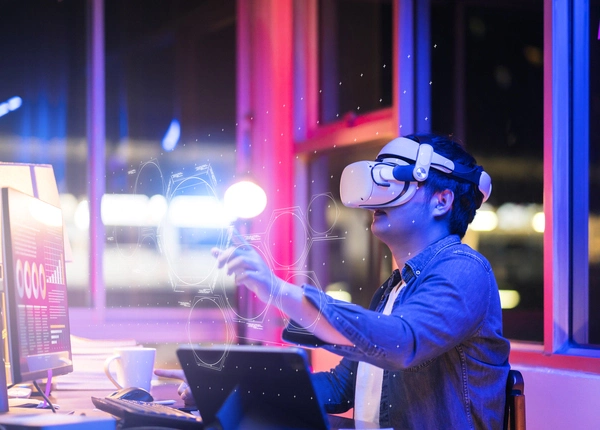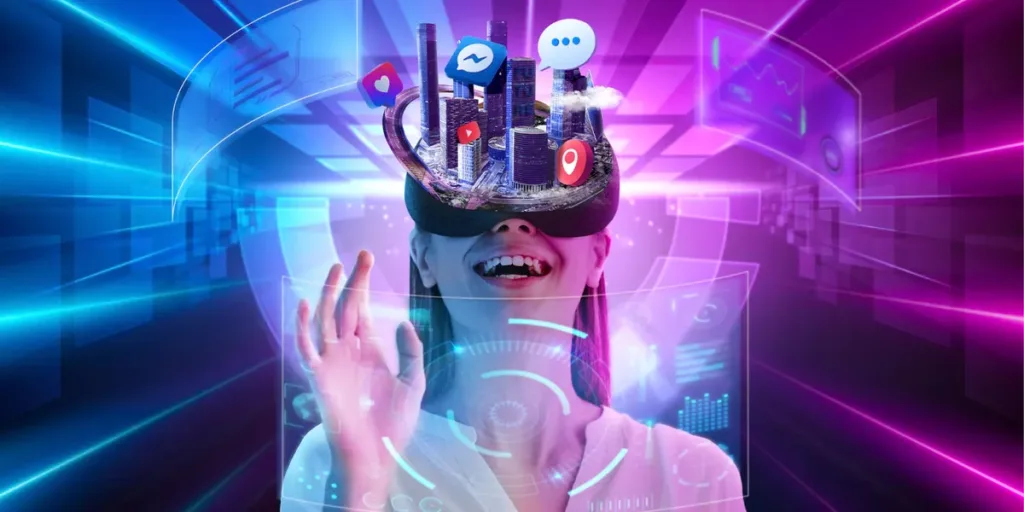Introduction
The concept of a metaverse—an immersive virtual world that combines aspects of social media, online gaming, augmented reality (AR), virtual reality (VR), and cryptocurrencies—has taken the world by storm. Pioneered by companies like Meta (formerly Facebook), Microsoft, and Roblox, the metaverse promises to transform how we work, play, and interact in the digital world. However, what is the metaverse development precisely, and how will it impact our lives? This comprehensive guide will answer all your questions about this emerging digital reality revolution.
What is the Metaverse?
At its core, the metaverse development refers to a shared virtual space that can be accessed through devices like VR and AR headsets, smartphones, computers, and more. In the metaverse, digital representations of ourselves called avatars can interact with digital objects and other avatars in an interactive 3D virtual environment.

Some key aspects that define the metaverse include:
- Immersiveness: The metaverse aims to provide an immersive experience that makes users feel like they are truly present in the virtual world through technologies like VR and AR.
- Interoperability: Users should be able to seamlessly transition between different virtual worlds in the metaverse using the same avatar. Their purchases, profiles, social connections, etc. should be portable across platforms.
- Persistence: The metaverse aims to provide a sense of persistent online world that continues to exist and evolve even when you are offline.
- Shared social spaces: Users will be able to interact with other users’ avatars, participate in virtual events, and engage in a variety of social and economic activities together.
- Digital economies: The metaverse development is expected to have in-world economies where users can purchase, sell, and own virtual assets like lands, avatars, clothing, etc. using cryptocurrencies.
In essence, the metaverse takes the internet to the next level by making it more immersive and integrating it with virtual worlds, avatars, digital economies, and new forms of interaction. It aims to transform how we use and experience the internet.
How will the Metaverse Impact our lives?
Proponents believe the metaverse will disrupt and change various aspects of our lives in profound ways:

Work and productivity: In the metaverse, remote work and collaboration will become seamless through virtual meeting rooms, shared whiteboards, virtual workspaces, etc. This can boost productivity for many knowledge workers.
Education and learning: Immersive virtual classrooms and learning experiences in the metaverse development are expected to make education more engaging and effective for all ages. Students can learn through interactive simulations and virtual field trips.
Social interaction: The metaverse will provide new ways to socialize and connect with friends and family through shared virtual spaces and activities. This might reduce feelings of isolation and loneliness.
Entertainment: From interactive games and esports to virtual concerts and events, the metaverse is poised to transform how we are entertained. New forms of storytelling will emerge.
Shopping and commerce: Users will be able to virtually try out products, visit digital stores and shopping malls, and make purchases to outfit their avatars. This could boost e-commerce.
Travel: Through virtual and augmented reality, the metaverse may allow users to “visit” new places without the constraints of physical travel. This could open up new tourism experiences.
Real estate: As virtual lands, properties and venues become scarce resources in the metaverse development, they will gain real monetary value. This could create new investment opportunities.
Healthcare: The metaverse has applications in areas like medical training, remote therapy, fitness, and more. It could help improve access to care globally.
So in summary, the metaverse promises to enhance how we work, learn, socialize, shop, and be entertained by integrating the physical and digital worlds like never before. It aims to revolutionize how humanity lives, interacts, and does business online.
Companies are Leading the Metaverse Development
Several tech giants are making big investments and pushing boundaries to define the metaverse experience.

- Meta (formerly Facebook): Meta CEO Mark Zuckerberg has identified the metaverse as the future of the company. Meta is building immersive VR worlds and developing technologies like augmented reality to power metaverse development.
- Microsoft: The software giant is focused on building an open metaverse platform and tools to enable collaboration across virtual, augmented, and real worlds. It has acquired the VR chat platform AltspaceVR.
- Roblox: The popular gaming platform is already a metaverse of sorts, allowing users to build 3D worlds and games. It aims to transform into a metaverse experience for both gaming and non-gaming use cases.
- Epic Games: The Fortnite creator is building an open-source metaverse through its Unreal Engine and plans to offer interoperable virtual spaces and economies.
- Nvidia: The chipmaker is focused on developing advanced graphics technologies like Omniverse to power highly realistic virtual worlds in the metaverse.
- Tencent: The Chinese conglomerate owns stakes in Epic Games and Activision Blizzard. It is exploring metaverse applications through games and social platforms.
- Sony: Through PlayStation VR, Sony is well-positioned to bring its gaming expertise to the metaverse through virtual worlds and economies.
- Decentraland: This Ethereum-based virtual world allows users to build, own and monetize virtual lands and assets through its native cryptocurrency MANA.
So while still in the early stages, tech giants are making big bets that the metaverse will transform how we use technology in the future. Their investments aim to define the infrastructure, platforms and experiences of this emerging digital world.
Opportunities and Challenges of the Metaverse
Like any new technology, the metaverse comes with both opportunities as well as challenges that need to be addressed:
Opportunities:
- New markets and revenue streams: The metaverse could unlock new multi-billion dollar markets in areas like virtual goods, digital real estate, advertising, events and more.
- Jobs of the future: Emerging professions around virtual world design, programming, marketing and more could create new high-paying career opportunities.
- Democratization of access: The metaverse may help bridge the digital divide by providing more affordable access to services like education, work and healthcare for those in remote areas.
Challenges:
- Technology barriers: Widespread adoption depends on developing affordable and high-quality AR/VR devices. Network latency issues also need to be solved.
- Safety and privacy: With a persistent virtual world, new risks may emerge around harassment, exploitation, data privacy and security that need mitigation.
- Addiction potential: Some experts warn that immersive virtual worlds may increase addiction risks for vulnerable groups like children if not designed carefully.
- Digital divide: Access to high-end metaverse experiences may further privilege those with means, risking greater socioeconomic stratification online.
- Monetization challenges: New business models need innovation to monetize virtual goods and services in a way that benefits both companies and users.
- Regulation: With its cross-jurisdictional nature, regulating the metaverse to address the above challenges while enabling innovation will be complex.
Overall, while the metaverse promises unprecedented opportunities, overcoming the technological and socioeconomic barriers as well as ensuring user well-being will be important to realize its full potential. Concerted efforts are needed across industry, government, and civil society to shape its development positively.
Investing and Making Money in the Metaverse
As the metaverse matures into a multi-billion dollar digital economy, there will be many ways for entrepreneurs and investors to participate in and profit from its growth:
- Virtual real estate: As land and property within popular metaverse platforms become scarce, their value will appreciate over time. Early investors can buy plots now and sell them later at a premium.
- Cryptocurrencies: Many metaverse platforms will have their own native cryptocurrencies which can be purchased now in the expectation they will rise in value as those worlds grow. Examples include MANA, SAND, and AXS.
- NFT investments: Exclusive virtual fashion items, art, collectibles etc. are being traded as NFTs. Investing in popular NFT collections from up-and-coming designers can yield returns.
- Gaming stocks: Companies like Roblox, Unity, and Epic Games which are building metaverse-style games are likely to benefit from the trend. Their stocks could deliver returns.
- VR and AR technology: Semiconductor companies developing more powerful and affordable VR/AR hardware could see growing demand. Their stocks are a play on the theme.
- Virtual world creators: Early entrepreneurs building out virtual worlds, economies, and platforms may see their projects acquire value as the metaverse ecosystem expands.
- Job/service marketplaces: As the metaverse spawns new professions, marketplaces connecting talent with work could emerge as useful investment opportunities.
- Metaverse infrastructure: Startups building tools around identity, payments, spatial computing, etc. that underpin the metaverse are well-positioned to grow.



